Tennessee Poll finds Tennesseans concerned about becoming ill with COVID-19
JOHNSON CITY (May 13, 2020) – Tennesseans are closely following news about the COVID-19 pandemic. They express concern about themselves or a loved one being infected and they are making choices accordingly, finds the most recent Tennessee Poll. The Applied Social Research Lab (ASRL) at East Tennessee State University surveyed 618 Tennesseans from April 22-May 1, 2020, about their thoughts, concerns and actions related to COVID-19. This field period was uniquely situated as the statewide stay-at-home order expired and Tennessee entered into phase one of its reopening plan.
This is the first of a series of releases on the 2020 Tennessee Poll. Visit www.etsu.edu/asrl/tnpoll for additional analysis, methodological reporting, and margin of error calculations for sample and subgroup analysis.
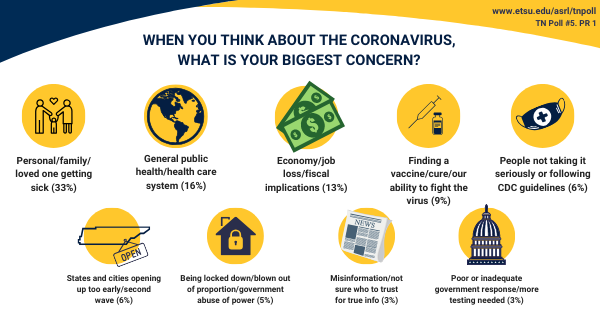
The vast majority of Tennesseans state they are either very closely or closely following news about the novel coronavirus (63% and 30%, respectively). When asked what their biggest concern is regarding the coronavirus, the top three most frequently mentioned responses were fear of themselves or a loved one getting the virus (33%), general concern over public health and people around the country getting sick and the impact on the health care system (16%), and the impact on the economy (13%). One Tennessean echoed the sentiments of many respondents when s/he stated “I worry not only about contracting the illness, but of not being able to survive it. This concerns me so much that my family and I discussed end of life measures and we all agreed as adults to complete living wills.”
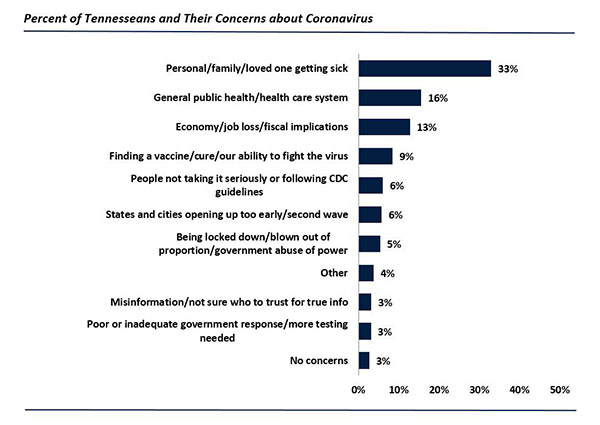
As stay-at-home orders progressed, so did protests against perceived government overreach however it appears that protestors represented a small, though vocal, minority of Tennesseans. Our findings indicate that only a small percentage of Tennesseans feel either the federal or state government went too far in their actions to slow the spread of the virus (10% for federal and 10% for state, respectively). In fact, 45%, of all Tennesseans feel that the measures taken by the federal government to slow the spread of COVID-19 have been appropriate and an additional 38% believe they have not gone far enough. There are stark contrasts in support for federal government response along party lines. Higher levels of support exist among Republicans (67% of whom say the federal response is appropriate) compared to Independents or Democrats who are more likely to indicate that the federal response was not sufficient (39% and 72%, respectively). African Americans are also significantly more likely to report that the federal government response did not go far enough than their white counterparts (58% compared to 33%).
Though generally supportive of the federal response to the COVID-19 pandemic, Tennesseans respond even more favorably when asked specifically about the state response to the COVID-19 pandemic. According to our poll, nearly half of all Tennesseans (49%) believe that the measures taken by the Tennessee state government have been appropriate to slow the spread of the virus. While the most common response among African American respondents is that the state of Tennessee did not go far enough (47%) they are more likely to report feeling that Tennessee’s response was appropriate than they did the federal response (37% compared to 25%).
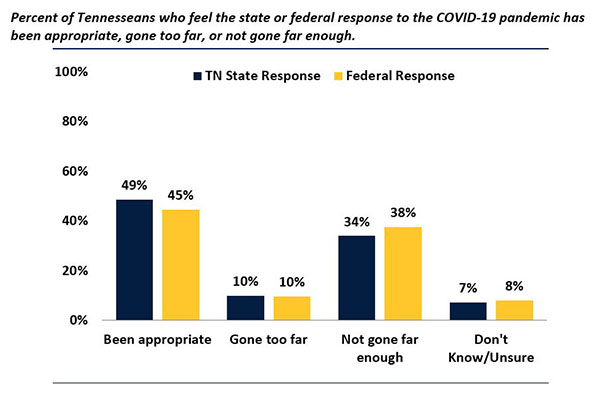
Not surprisingly, given generally high levels of support for both federal and state response to the COVID-19 pandemic, slightly more than half of Tennesseans have some level of confidence that the government will be able to limit the impact of the outbreak over the next few weeks. Seventeen percent of Tennesseans report that they are very confident in the ability of the government to limit the impact of the virus and 37% are somewhat confident. These rates are similar to findings in national polls1 whereby a majority of Americans express some level of confidence in the ability of the government to limit the impact of the viral outbreak.
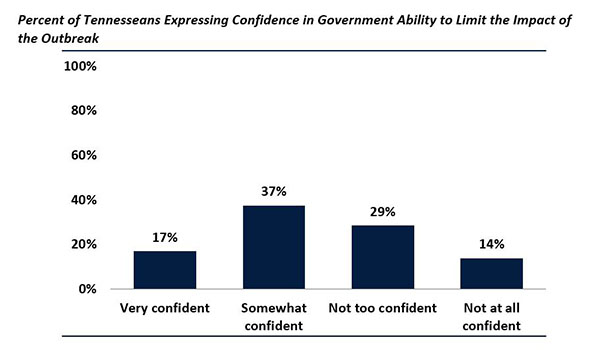
Despite generally supporting government response and feeling reasonable levels of confidence in the ability of the government to manage the impact of the virus, Tennesseans are largely hesitant to return to their pre-COVID level of interaction and activity. This could be an indicator of how likely Tennesseans are to return to businesses and jumpstart the economy during the phased reopening plan. Only 17% of Tennesseans said that they would immediately return to their normal activities once government restrictions were lifted, including interacting with people in public. The majority of Tennesseans, 53%, said they will wait and see what happens and slightly more than one-quarter (27%) said they plan on limiting their activities indefinitely. When asked if there were no government restrictions whatsoever and they could decide for themselves about being out in public how soon they would resume their normal day-to-day activities, nearly 6 in 10 respondents indicated they would do so only after the number of new cases declined significantly (31%) or there are no new cases for a period of time (28%).
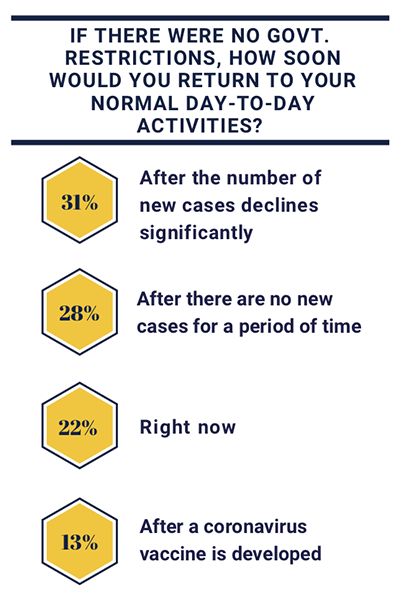
About the Tennessee Poll
The Tennessee Poll is conducted by the Applied Social Research Lab (ASRL) in the Department of Sociology and Anthropology at East Tennessee State University. ASRL is directed by Dr. Kelly N. Foster, associate professor of sociology.
The Tennessee Poll is an annual public opinion poll funded by East Tennessee State University. The mission of The Tennessee Poll is to provide the citizens and governance of Tennessee with neutral, unbiased information on Tennesseans perceptions of issues that impact their health, education, and quality of life.
Though the project has been internally funded to date, there is exists the possibility of outside researchers or organizations being given the option to purchase space for questions on future polls. Should this occur, any and all funding sources will be noted in the methodology report for that particular poll.
The Applied Social Research Lab is a member of the Association of Academic Survey Research Organizations (AASRO) and adheres to the reporting requirements of the American Association for Public Opinion Research Transparency Initiative standards in research reporting.
For detailed information on The Tennessee Poll, including methodology and additional analysis, please visit www.etsu.edu/asrl/tnpoll.php.
Survey Methodology
The Tennessee Poll uses random digit dialing (RDD) to ensure that all Tennesseans are represented. Phone numbers were drawn from a dual frame RDD sample of cell phone and landline numbers. Braun Research Inc. acquired the cell phone sample and completed the telephone interviews. It is important to note that this particular Tennessee Poll (poll #5) was fielded during the time of the COVID-19 pandemic. Though ASRL maintains an active computer-assisted telephone interviewing (CATI) lab for research purposes that utilizes ETSU student callers, the phone lab was closed due to state regulations during this time. Braun Research Inc had capabilities and were utilizing secure remote calling with their phone interviewers during this time so in addition to acquiring the sample, they also completed the interviews.
The final sample includes a total of 618 completed interviews, 188 completed by landline (30.4% percent) and 430 completed by cell phone (69.6% percent). The final data are weighted by age, education, gender, and race to adjust for differential response rates in order to assure that the data are as representative of the state’s actual adult population as closely as possible. The margin of error for a sample of 618 is +/- 3.9 percentage points at the 95% confidence level for the entire sample. Any subpopulation analysis entails a greater margin of error. For detailed methodology on The Tennessee Poll as well as margin of error reports and additional analysis, please go to www.etsu.edu/asrl/tnpoll.php.
About the Authors
Kelly N. Foster, PhD. is an associate professor of sociology and director of the Applied Social Research Lab (ASRL) at ETSU. Her expertise is in survey research methodology and she has worked in public opinion research for 17 years. She is a member in good standing of the American Association for Public Opinion Research (AAPOR) and currently serves on the executive council for the Association of Academic Survey Research Organizations (AASRO) where ASRL is a member organization.
Candace Forbes Bright, PhD. is an assistant professor of sociology and faculty affiliate of the Applied Social Research Lab (ASRL) at ETSU. Her expertise is in research methodology and social issues, including public health and race.
Morgan Kidd, M.A. is the assistant director for the Applied Social Research Lab (ASRL) at ETSU. She received her Master of Arts in Sociology from ETSU. She is an active member in good standing with the American Association for Public Opinion Research (AAPOR) and is active with the International Field Directors & Technologies Conference annually.
[1] Monmoth Poll https://www.monmouth.edu/polling-institute/reports/monmouthpoll_us_051120/
NOTE: To receive forthcoming TN Poll results, contact Jennifer Hill at hill@etsu.edu to be added to the distribution list.